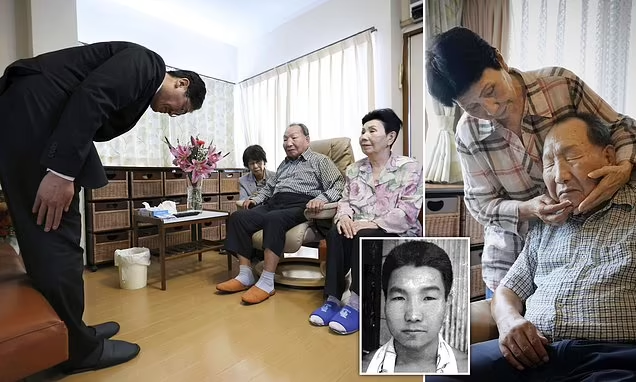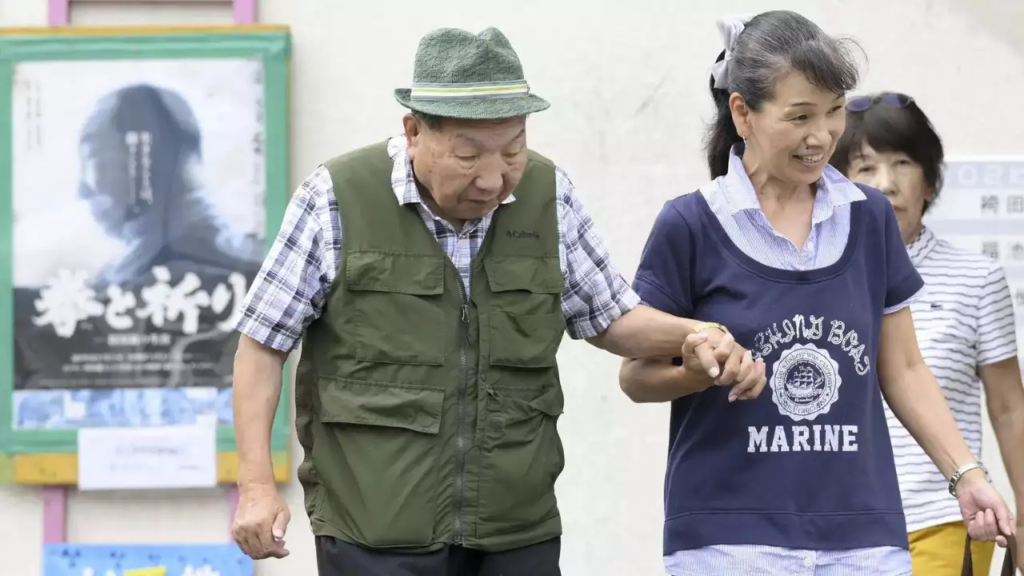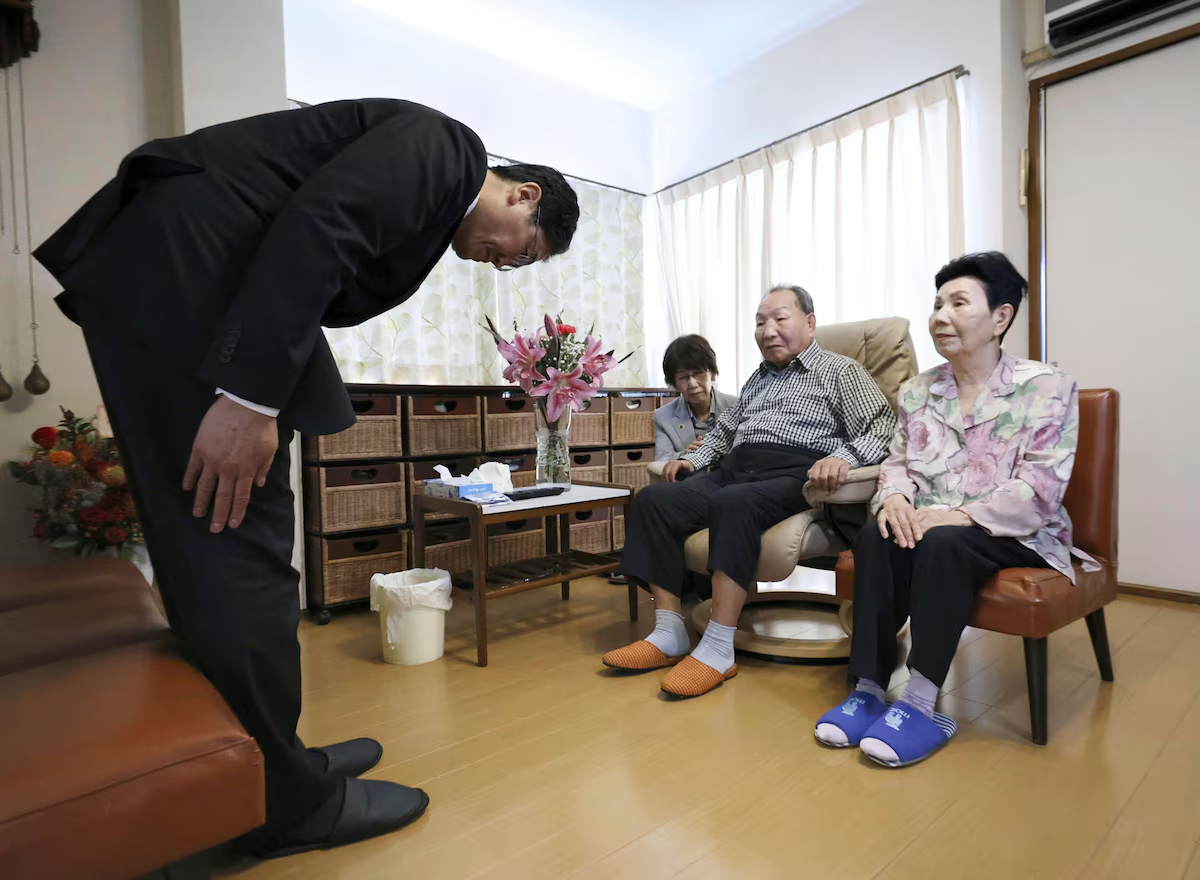In a rare and emotional moment, the head of Shizuoka Prefectural Police personally visited Iwao Hakamada, an 88-year-old man who was acquitted after spending nearly 50 years on death row. His case, which has raised concerns about Japan’s legal system, finally came to a close after decades of appeals, legal battles, and wrongful imprisonment.
Hakamada, a former professional boxer, became one of the longest-serving death row inmates in the world before being acquitted in a retrial. This blog delves into the key details of the case, the apology from the police, and its broader implications for Japan’s criminal justice system.
The Case of Iwao Hakamada: A Tragic Miscarriage of Justice
Iwao Hakamada’s nightmare began in August 1966, when he was arrested for the brutal murder of an executive at a miso bean paste company and three of the executive’s family members. The crime took place in Hamamatsu, central Japan, and immediately shook the nation.
Hakamada, a former boxer with no history of violent behavior, was accused of the heinous crime and soon found himself embroiled in a situation that would trap him for nearly six decades.
During the initial investigation, the police were determined to secure a conviction. Hakamada was subjected to violent interrogations that lasted for hours, during which he was coerced into signing a confession. It later emerged that this confession was obtained under duress and during closed-door interrogations, with Hakamada having no access to legal representation at the time.
Read : Japanese Atomic Bomb Survivors’ Group Nihon Hidankyo Awarded 2024 Nobel Peace Prize
It was a brutal and aggressive investigation, typical of a system that many have since criticized for focusing on securing confessions rather than determining the truth.
In 1968, Hakamada was sentenced to death by the Shizuoka District Court, based primarily on this forced confession and fabricated evidence planted by the police and prosecutors. His death sentence loomed over him for nearly 50 years, during which time he was held in solitary confinement, waiting for an execution that could have been carried out at any moment without prior notice.
Read : Imperial Palace Japan: A Glimpse into the Heart of Japanese Royalty
What followed was an excruciatingly long battle for justice. Over the years, Hakamada’s legal team and his sister, Hideko Hakamada, worked tirelessly to appeal the conviction and bring attention to the unjust treatment he had faced. It wasn’t until 2014—nearly five decades later—that the court granted a retrial and ordered his release from death row. However, even after his release, his conviction remained intact, leaving him in a legal limbo until the court finally acquitted him in 2023.
The Apology: A Rare Gesture of Accountability
On Monday, Shizuoka Prefectural Police chief Takayoshi Tsuda visited Hakamada at his home to deliver a formal apology for the immense suffering caused by his wrongful conviction. In an emotional moment, Tsuda, standing before Hakamada and his sister, offered a deep bow—a traditional gesture of remorse in Japanese culture—and expressed regret for the 58 years of pain Hakamada had endured.
“We are terribly sorry to have caused you unspeakable mental distress and burden for as long as 58 years from the time of the arrest until the acquittal was finalized,” Tsuda said. He acknowledged the wrongful conduct by the police during the investigation and promised that future investigations would be carried out meticulously and fairly.
The apology, though meaningful, came decades too late for Hakamada, who had already spent much of his life confined to a solitary cell, with his mental and physical health deeply affected by his time on death row.

Hakamada, who has difficulty carrying out conversations due to the psychological trauma he experienced, responded with a simple but poignant remark: “What it means to have the authority… Once you have the power, you’re not supposed to grumble.” His response highlighted not just the injustice he suffered, but also the weight of power that authorities bear when their actions can alter the course of a person’s life so drastically.
Hakamada’s sister, Hideko, who has stood by her brother’s side throughout the long and grueling legal battle, graciously accepted the police chief’s apology. She told reporters afterward that she chose to accept the visit because she wanted her brother to have a clear break from his past as a death row inmate and to move forward without lingering bitterness.
Implications for Japan’s Justice System: Calls for Reform
The wrongful conviction and eventual acquittal of Iwao Hakamada have brought attention to the flaws in Japan’s criminal justice system, particularly its reliance on confessions and the lack of transparency in investigations.
In Japan, the conviction rate for criminal cases hovers around 99%, largely because police and prosecutors focus on extracting confessions during interrogations. Many of these confessions, as in Hakamada’s case, are obtained under immense pressure, leading to widespread concerns about the fairness of the system.
Hakamada’s case has reignited calls for reform, with legal experts and human rights advocates pushing for greater oversight during police interrogations and a reduction in the barriers to granting retrials. Japan’s legal system, while respected for its efficiency, has been criticized for its failure to adequately safeguard the rights of the accused. The retrial process, for instance, is extremely rare, and only a handful of death row inmates have been acquitted in postwar Japan.
Hakamada’s acquittal marked only the fifth time in postwar history that a death row inmate was found innocent. His case underscores the need for reforms that ensure investigations are conducted with integrity and that convictions are based on solid evidence rather than confessions obtained through coercion.

Moreover, the case has sparked a renewed debate over the use of the death penalty in Japan. While the majority of the public continues to support capital punishment, Hakamada’s wrongful conviction has raised questions about the potential for irreversible errors in the system. His near-execution serves as a powerful reminder that, once a death sentence is carried out, there is no way to correct a mistake.
Iwao Hakamada’s story is one of unimaginable suffering, but it is also one of resilience and hope. For nearly 50 years, he endured the isolation and fear that came with being on death row, all while knowing that he was innocent of the crime he had been accused of. His acquittal in 2023 was a long-overdue victory, but it came at the cost of his mental and physical well-being.
The apology from the police chief, though symbolic, represents a step toward acknowledging the grave injustice that Hakamada faced. It is also a moment of reflection for Japan’s criminal justice system, which must now confront the need for reform to prevent future miscarriages of justice.
For Hakamada, his sister Hideko, and their supporters, the end of this long legal battle is bittersweet. While they have achieved the goal of clearing Hakamada’s name, they are left to grapple with the scars left by decades of wrongful imprisonment. Nevertheless, the case of Iwao Hakamada will undoubtedly leave a lasting impact on Japan, as it forces a nation to reckon with the fallibility of its justice system and the urgent need for reform.

